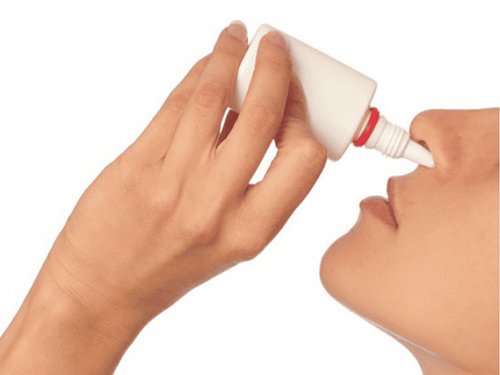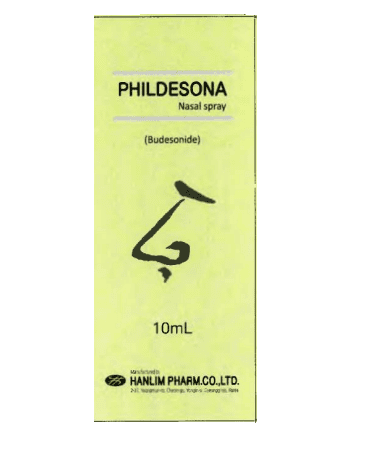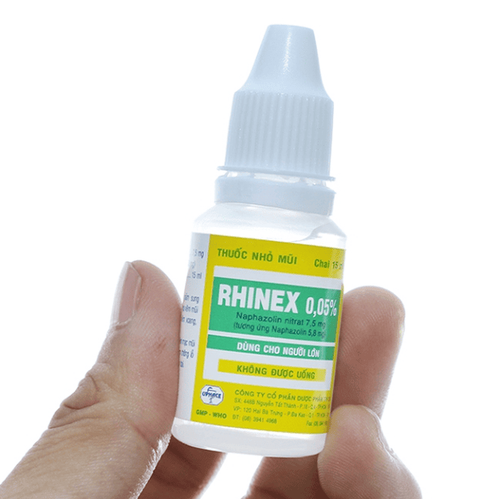This is an automatically translated article.
Nasal sprays are used to treat symptoms in some respiratory infections, nasal sprays are common, but not all patients know how to use them properly. If not used correctly, prolonged use can cause some complications.
1. When to use nasal spray?
Nasal spray is a form of medicine used to treat respiratory diseases. Nasal sprays are drugs that are packaged in bottles, with a nozzle that shoots very small jets of water, when using the spray has advantages over nasal drops such as ease of use and the drug is divided into small particles. Tiny particles easily penetrate into the nasal cavity, nasal mucosa, so the drug has a quick and long-lasting effect.
Nasal sprays are usually drugs to treat symptoms in diseases such as: allergic rhinitis, sinusitis, nasopharyngitis, nasal congestion after surgery..
Nasal sprays include:
Group of drugs Vasoconstrictor: Has the effect of constricting the nasal vasculature to clear the airways and limit nasal congestion. These drugs can have many different brand names, but the main ingredients are naphazolin, oxymetazolin... Antihistamine group: Used to relieve symptoms of sneezing, runny nose, itchy nose in inflammatory diseases. allergic rhinitis. These medications can cause drowsiness as a side effect.
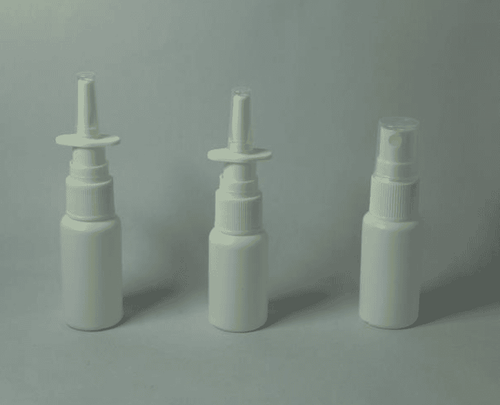
Thuốc xịt mũi có nhiều nhóm khác nhau, người bệnh chỉ dùng khi có chỉ định của bác sĩ
2. How to use nasal spray
Steps to use nasal spray correctly:
Prepare nasal spray, physiological saline, tissue. Hand hygiene: Before touching your nose and mouth, wash your hands with soap and water, then dry your hands with a clean towel. If soap and water are not available, wash with an antiseptic solution. Before spraying the nose, it is necessary to wash and clear the nose: Wash the nose by instilling physiological saline into the nose, to thin the mucus, then blow the nasal mucus and dirt into a tissue. Clearing the nose has the effect of making the drug penetrate more into the nasal mucosa, increasing the effect of the nasal spray. Nasal spray: Shake the bottle gently before spraying (pay attention to the information on the package to see if it is necessary to shake), open the bottle cap, place the bottle directly into the nose and spray firmly, and at the same time inhale to let the medicine go deep into the nose. inside. Do the same with the other side of the nose. Depending on the recommendations on the instructions for use, spray once or more, paying attention to the intervals of about 10 seconds. After spraying: Close the spray bottle carefully, then wash your hands with soap and water to avoid getting the medicine into your eyes or mouth. Note that after spraying, if you want to sneeze, sneeze immediately and do not blow your nose right away, wait a few minutes before blowing your nose to avoid swelling of the nasal mucosa.
3. Notes when using nasal spray
Diseases related to allergies often occur when the weather changes, when exposed to allergens, so patients often use nasal sprays for a long time. These drugs can relieve symptoms quickly but can cause some unwanted effects, when misused for a long time.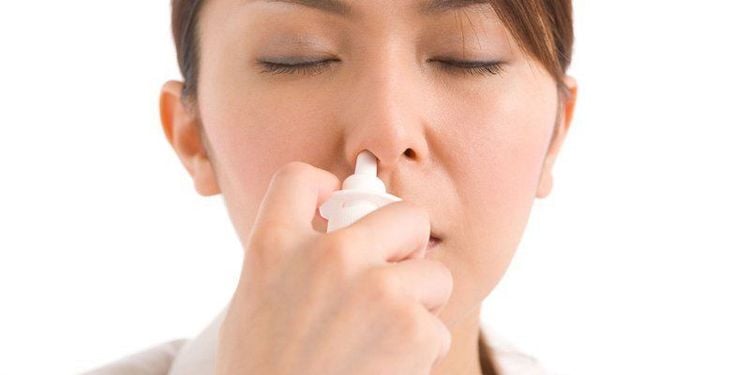
Thuốc xịt mũi giúp giảm nhanh chóng các triệu chứng khó chịu ở mũi người bệnh
Some notes to pay attention to when using nasal spray:
When using the drug in terms of dosage, the time to use the nasal spray must follow the instructions of the doctor. When using vasoconstrictor drugs such as naphazolin, oxymetazolin... to treat symptoms of nasal congestion, the effect will be very fast, but it is not advisable to abuse nasal sprays for a long time. Because long-term use will cause a number of complications such as: Irritation of the nasal mucosa, reducing the response of vasoconstrictors to the nasal sphincter. The medicine won't work as well as it did when it's really needed. Long-term use may cause systemic side effects such as: increased blood pressure, nervous anxiety, headache, dizziness, nausea, increased heart rate or reflex bradycardia. Should be very careful with patients with chronic diseases such as coronary artery disease, hypertension, diabetes mellitus, hyperthyroidism. Vasoconstrictor drugs are not used for children under 6 years old, pregnant women have no evidence of safety when using, especially in the first 3 months of pregnancy.
Antihistamine nasal sprays can be used for a longer time, these groups of drugs cause side effects or cause drowsiness and are not for use in children under 2 years of age. When spraying, avoid touching the tip of the spray bottle to the inside of the nose, because touching can cause infection. Do not share nasal sprays with anyone. When there are abnormal signs such as nosebleeds, burning pain when using nasal spray, it is necessary to immediately notify medical staff to find the cause and handle.

Người bệnh sử dụng thuốc xịt mũi theo phác đồ điều trị của bác sĩ Tai Mũi Họng
Vinmec International General Hospital examines and treats common nasopharyngitis diseases, head and neck tumors, congenital malformations of the ear, nose and throat area with the most optimal internal-surgical methods for patients, both children and adults. Coming to Vinmec International General Hospital, patients will receive direct, dedicated and professional examination from a team of qualified and experienced medical staff.
To register for examination and treatment at Vinmec International General Hospital, you can contact Vinmec Health System nationwide, or register online HERE
MORE
What to know about Seretide Asthma Spray Is Allergic Rhinitis Contagious? Diagnostic tests for allergic rhinitis





